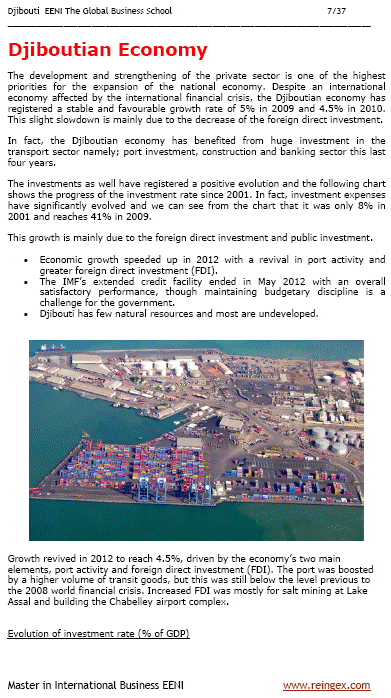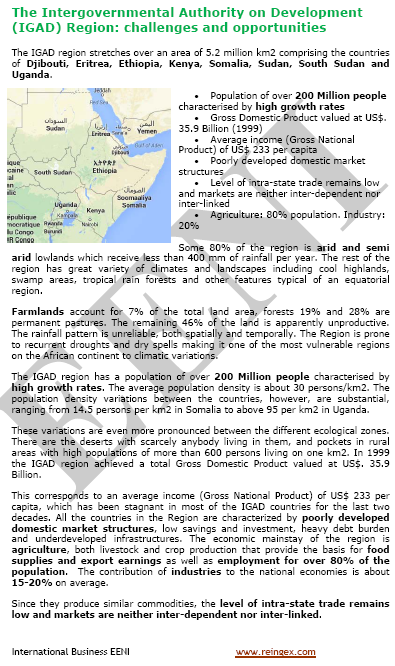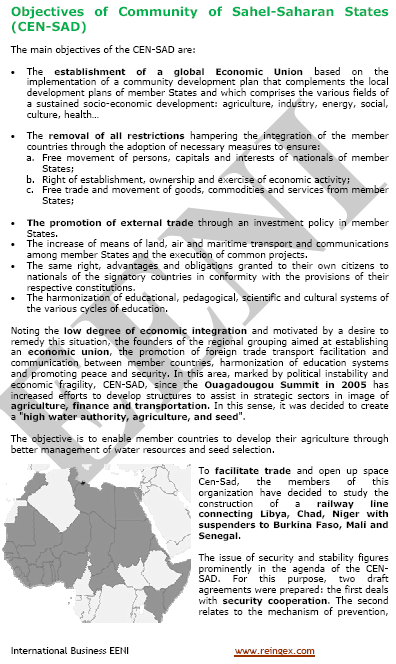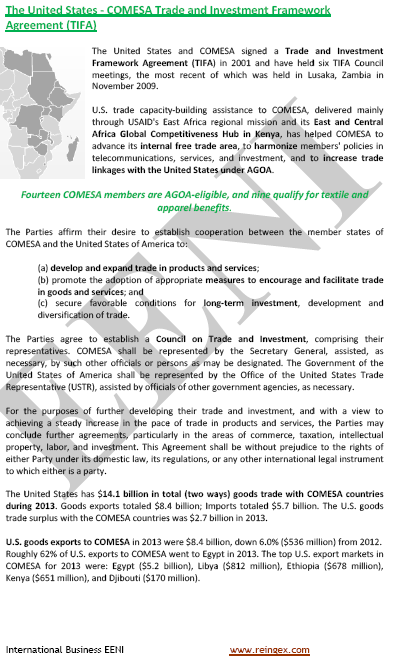Business in Djibouti

Foreign Trade and Business in Djibouti
- Introduction to the Republic of Djibouti (East Africa)
- Djiboutian Economy
- International Trade of Djibouti
- Telecommunications and New Technologies in Djibouti
- Investment in Djibouti
- Access to the Djiboutian Market
- Business Plan for Djibouti
The objectives of the subject “International Trade and Business in Djibouti” are the following:
- To analyze the Djiboutian Economy and Global Trade
- To know the business opportunities in Djibouti
- To explore the Djiboutian trade relations with the country of the student
- To know the Djiboutian Trade Agreements
- To analyze the importance of the Port of Djibouti
- To develop a business plan for the Djiboutian Market
Global Trade and Business in Djibouti:
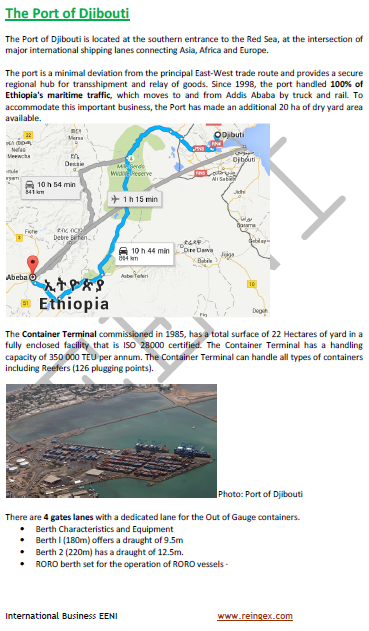

The Subject “Foreign Trade and Business in Djibouti” belongs to the following Online Programs taught by EENI Global Business School:
Doctorate: African Business, World Trade.
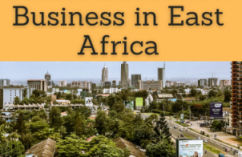
Masters: Business in Africa International Business, Foreign Trade.
Languages:  or
or  Djibouti
Djibouti  Djibouti
Djibouti  Djibuti.
Djibuti.
- Credits of the subject “Doing Business in Djibouti”: 2

- Duration: two weeks

International Trade and Business in Djibouti
Djibouti: an economy based on services (marine transport and telecommunications).
Access to the Ethiopian Market.

- Port of Djibouti
- Access to the Ethiopian Market
- N’Djamena-Djibouti Corridor


Preferential Access and Trade Agreements of Djibouti
- Djibouti and the East African Economic Area
- Common Market for Eastern and Southern Africa (COMESA)
- Community of Sahel-Saharan States (CEN-SAD)
- Intergovernmental Authority on Development (IGAD)
- COMESA-EAC-SADC Agreement
- African Continental Free-Trade Area
- EU-Djibouti
- The U.S.-Djibouti
- AGOA (U.S.)
- COMESA-US Agreement
- Islamic Trade Preferential System
- Arab Bank for Africa (BADEA)
- Islamic Centre for Development of Trade
- Greater Arab Free-Trade Area (GAFTA) - not a member
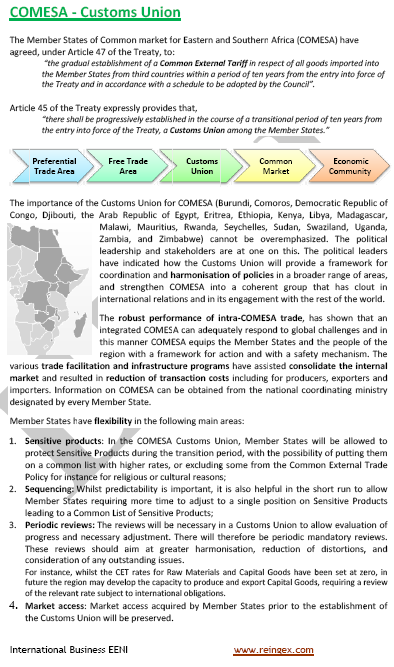

- WTO
- GATS
- Agreement on the Application of Sanitary Measures
- Agreement on Technical Barriers to Trade
- Agreement on Preshipment Inspection
- Agreement on Safeguards
- Trade Facilitation Agreement
- Is not a member of the WCO
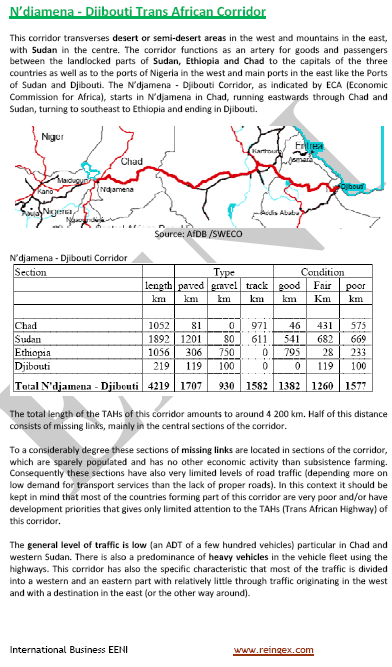
Islamic Organizations. Djibouti is a member of:
- Arab League
- Afro-Arab Cooperation
- BADEA
- OIC
- Committee for Economic Cooperation (OIC)
- Islamic Chamber of Commerce
- Statistical, Economic and Social Research and Training Centre for Islamic Countries
- Islamic Development Bank
- Asia-Middle East Dialogue (Djibouti)
- Summit of South American-Arab Countries (Djibouti)

- Economic Commission for Africa
- African Union
- AU Convention on Preventing and Combating Corruption (not signed)
- AUDA-NEPAD
- African Development Bank
- Africa-Asia Partnership
- Africa-Korea Partnership
- Africa-Japan Cooperation
- Africa-South America Summit
- Africa-BRICS

- UN
- WB
- WTO
- IMF
Djibouti has a strategic location in the Horn of Africa.
The Republic of Djibouti has an advantaged strategic location in the Horn of Africa and serves as a link for the interconnection with other member countries of the COMESA.
- Djiboutian Area: 23,200 km²
- Djibouti shares borders with Eritrea, Ethiopia, and Somalia
- Djiboutian Capital: Djibouti (21,200 people)
- The official languages of Djibouti are Arabic, French and Somali
- Djiboutian population: 890,000 people
- Type of Government: Semi-Presidential Republic
- Independence of Djibouti from France: 1977
More information about Djibouti (EENI African Business Portal).
Religion in Djibouti: Islam (94% of Djiboutian population).
- Fiqh: Shafi'i
- After the independence, the Republic of Djibouti built a legal system based partly on the Islamic Law
- The Constitution of Djibouti states Islam as the only religion of the State, while it provides the equality of citizens of all faiths (Article 1) and freedom of religious practice (Article 11)

Djibouti belongs to the East African Economic Area.
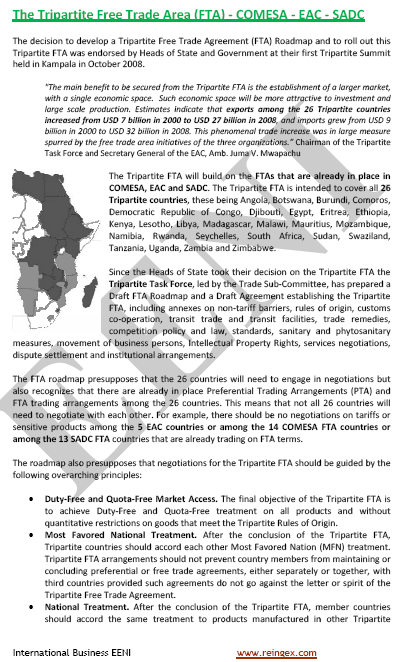

Djiboutian Economy:
- The Republic of Djibouti wishes to leverage its strategic position to be a regional hub for the international trade, financial services, and telecommunications
- This small country (890,000 inhabitants) is also characterized by a unique climate of security in this region
- Djibouti has created an enabling a good environment for the foreign direct investment
- Around the Port of Djibouti and the Djibouti-Ethiopia Railway; it has been developed other key sectors: banking, insurance, and distribution
- Djibouti, as other city-states like Singapore and Mauritius, wishes to take profit of its strategic position to become a regional centre in financial, logistics, and telecommunications sectors
- The main trading partner of Djibouti is France; but like the rest of Africa, China is every day more important in Djibouti
- The Republic of Djibouti offers access to many regional markets for companies seeking to expand their business
- Djibouti has preferential access to the countries of the COMESA, Intergovernmental Authority on Development (IGAD), Arab world, the markets of the EU, and the U.S. (AGOA)
- The Djiboutian economy depends on the services sector (87% of the GDP)
- The Economic Growth of the port of Djibouti also has been allowed by substantial foreign investment from the United Arab Emirates; in 2000, Dubai Ports (the third world port operator), has obtained the control of the port
- Headquarters of the Intergovernmental Authority on Development (IGAD)
